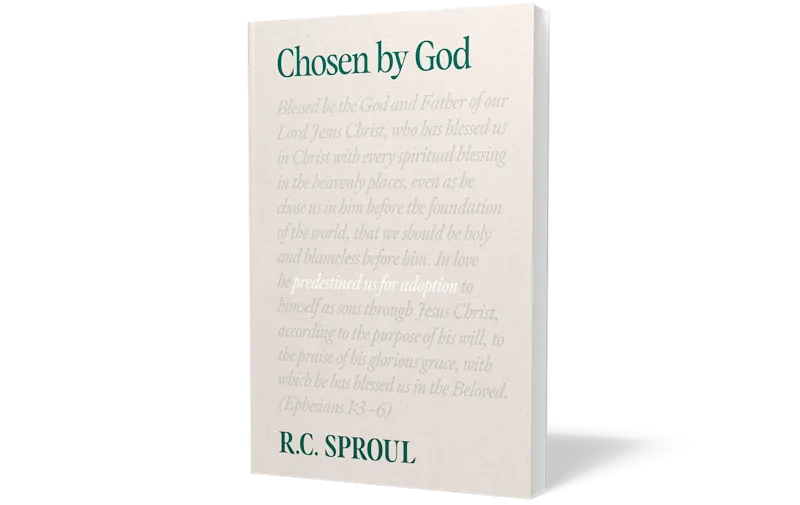Derek W.H. Thomas is the John Richards Professor of Practical and Systematic Theology at Reformed Theological Seminary in Jackson, Miss. He is also the minister of teaching at First Presbyterian Church in Jackson and editorial director for The Alliance of Confessing Evangelicals. Among Dr. Thomas' many books are God Strengthens: Ezekiel Properly Explained, Mining for Wisdom, and Calvin's Teaching on Job.
Dr. Thomas, addressing the topic Be Ye Holy: The Necessity of Sanctification, took us to I Peter 1:13-25.
INTRODUCTION
It is one thing to talk about the holiness of God and another thing to long for holiness in our own life. Consider the "third use" of the law (as a guide). Or Luther's refrain: We are saved by faith alone, but not by a faith that is alone. Or James: Faith without works is dead.
But ours is a man-centered age. We like books on how to be a good father or how to improve your diet, rather than how to be holy and Christ-like. And in our circles, we can get caught up with theological issues and miss the point that the goal of all theology is to drive us into a holiness of life. R. Murray Mc'Chenye's great statement has been noted: "My people's greatest need is my personal holiness." This is serious business because without holiness, the author of Hebrews tells us, no one will see the Lord.
**
MORAL IMPERATIVES ARE BASED ON GOSPEL INDICATIVES**
We see "therefore" at the start of our passage. Why? Because Peter is basing his moral imperatives on gospel indicatives. Confuse those two and you've confused the gospel. In the first two verses of I Peter we see that being addressed are "the elect exiles." And to what end? "Sanctification of the Spirit, for obedience to Jesus Christ." We are saved in order to be holy.
Notice how Trinitarian Peter is: "foreknowledge of God the Father, in the sanctification of the Spirit, for obedience to Jesus Christ." Each member of the Godhead works in concert with the others in foreordination and execution of salvation. What have we been called to? "An inheritance that is imperishable, undefiled, and unfading....joy that is inexpressible and filled with glory." We are to be holy because we've been brought into this relationship with God.
We are to think in Christian ways - in biblical ways. The battle begins in our minds. Dr. Thomas recalls visiting Geoffrey Thomas in Alfred Place, Aberystwyth, rising early and reading John Owen on indwelling sin. John Owen used to talk about "the default state" of your mind: what does your mind revert to when it is not being pushed in one direction or another. That is the indicator of your spiritual mindedness.
We see three motivations for holiness in I Peter 1:13-25.
MOTIVATION I: THE HOLINESS OF GOD
In verse 15-16 Peter cites the text from the holiness code: "you shall be holy, for I am holy." This gives us both a motivation and a standard for holiness. Because the members of the God-head are holy, God's people ought to be holy. We ought to reflect something of God's moral purity. How could it be otherwise?
I Samuel chapter 1. Consider the parameters whereby Hannah was motivated to be holy. In this passage we're introduced to this small family, Elkanah and his two wives, Hannah and Peninnah. While Hannah is unable to bear children, Peninnah's womb is quite fruitful. And apparently she rubs it in during the family's annual visits to the temple. In I Samuel 1 we see Hannah in anguish. Her husband insensitively suggests he ought to be more precious to Hannah than 10 sons. While Hannah prays inaudibly, Eli (with equal insensitivity) inquires as to whether she is drunk.
Hannah's prayer was straightforward: Give me a son, Lord, and I will give him back to You. Imagine the selflessness of Hannah, when God did give her a son: As soon as the child was weaned, she brought him to the temple. What was it that motivated her? It was the holiness of God (I Samuel 2:2). There is a beautiful attraction of holiness.
Is holiness our passionate concern? Is it what we yearn for, and pray for, and long for? Is holiness our personal passion? Our passion for our churches?
MOTIVATION II: THE GOSPEL
We have been bought--purchased: we are not our own (1:18). Peter is perhaps reflecting on that testimony he gave at Ceserea Phillipi: "You are the Christ, the Son of God." How to Jesus respond? He proceeded to explain that he must go to Jerusalem and die. And Peter's response: "Lord, you must be mistaken. You who are the Sovereign King -- this could never happen to you."
What dawned on Peter (upon his reflection of Ceserea Phillipi) is that Jesus had ransomed him from the vanity of this world. This is gospel logic. When something is bought, you have the right of private ownership. Peter is reflecting on the fact that he belongs to Jesus Christ. Blood was shed for me. A ransom was paid to set me free.
He goes on verses 20-21 to reflect upon the revelation of the gospel: "He was foreknown before the foundation of the world but was made manifest in the last times for the sake of you who through him are believers in God." Our holiness is based upon all that God has done to secure our redemption. What the redeemed soul needs is human holiness, not God's holiness or angelic holiness. But in the humanity of Jesus Christ. Those who santifies and those being sanctified are one and the same. We are, in progressive sanctification, to reflect the righteousness of Christ which has been reckoned and imputed to us.
Paul's language is that we have "believed into Jesus Christ." Peter says we are "living stones" in a building in which Jesus Christ is the chief cornerstone. (No surprise that Peter should choose the stone/building imagery -- Jesus gave Him the name rock.)
We have been brought into a relationship in which we can call God "Abba, Father." We have been brought into the family of God. That is why he goes into the importance of our loving one another. Dr. Thomas reflected on his own conversion as a young adult. It hit him that Christians were his true family. Peter is addressing holiness within the context of family life.
Dr. Thomas reflected on getting into trouble with the headmaster at the age of 12. That was painful, but nothing compared to the rebuke of his older brother. His 17 year old brother caught him in the hallway, took him aside and said, "You have let the family down." That is the logic of Peter's motivation here: We are to love one another sincerely, because we are family. When we fall short of God's glory, we let the family down. We let the Father down. It is a test of our love for God the Father.
MOTIVATION III: THE JUDGMENT OF GOD
We lack the time to expand upon this, but suffice it to say it is a neglected topic in our day. We are to give an account of the deeds done in the body. There is to be a judgment and rewards alloted. One of the motivations for holiness is that a day of reckoning is surely coming. Peter's concern for holiness here is in the midst of fiery trials.
Are you experiencing trials this morning? Peter would be saying to you: See that trial as God's gift to you. Embrace it. Don't waste your cancer, as John Piper wrote. See that trial in the purposes of our sovereign God as the very means to conform you into the image of God. That you may be able to say with Job: "When I am tried, I shall come forth as gold." Or as Charles Wesley wrote:
Finish then thy new creation:
Pure and spotless let us be;
Let us see thy great salvation,
Perfectly restored in thee;
Changed from glory into glory,
Till in heaven we take our place,
Till we cast our crowns before thee,
Lost in wonder, love and praise.

